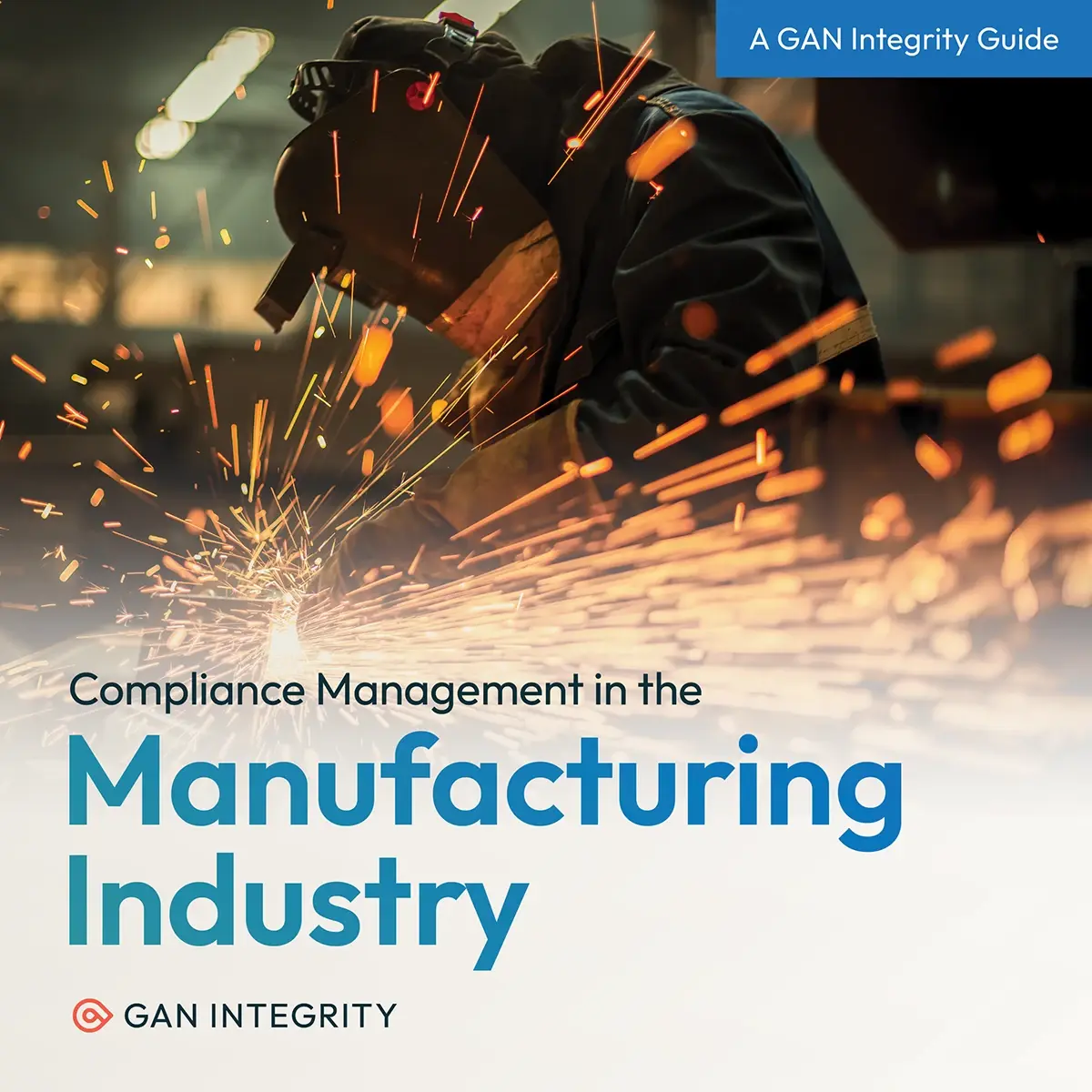Manufacturing
Manufacturing compliance software
Benefit from a centralized, data-driven approach to corporate compliance, ethics and third-party risk management, trusted by leading manufacturers worldwide. With less effort and more reach, you finally get a better way to do your good work.

Trusted by the world’s leading manufacturers
.png?width=1497&height=282&name=image%20(5).png)
Why leading manufacturers rely on GAN Integrity
Industrial manufacturing compliance software is how compliance teams at manufacturers get the tools and expertise to stay ahead of risk. With less effort and more reach, you finally get a better way to do your good work.
See everything – Gain a connected view of regulatory risk and compliance in one platform for more effective program management.
Adapt to anything – Tailor the platform to your organization, regardless of your tech stack, regions, risk appetite, and other complexities -all without heavy lifting or expense.
Get all the help you need – Receive dedicated support from GAN Integrity’s team of experts.
Compliance challenges for the manufacturing industry

As a compliance professional in the manufacturing industry, it often feels like you're fighting an unfair fight. You are tasked with navigating an extensive range of regulations, standards, and guidelines that vary across jurisdictions and constantly shift with emerging risks. The complexity of your industry, characterized by intricate supply chains, further compounds compliance, geopolitical, and location risks.
The responsibility doesn't end within your company's four walls; it reaches into the entire extended enterprise. You need to know who your third parties, suppliers, and intermediaries are, ensure they maintain appropriate controls to meet your ethical standards, and continuously monitor changes in their risk profiles.
This is a daunting challenge, especially when compliance teams are often small and resources are spread thin across multiple departments. Silos are common, particularly when working with disparate compliance and business systems that fail to integrate and communicate effectively.
You deserve better.
Key areas of compliance in manufacturing
Manufacturing companies are complex enterprises. There are many areas of compliance, ethics, and risk that need to be managed, spanning everything from Environmental, Social and Governance (ESG), to Good Manufacturing Practices (GMP) and Anti-Bribery And Corruption (ABAC). These include:
- ABAC Compliance: Upholding anti-bribery and anti-corruption laws and standards.
- Supply Chain Due Diligence: Examination and evaluation of the supply chain beyond Tier 1 to manage compliance and ethical risks.
- Data Protection: Safeguarding sensitive information.
- Environmental Compliance: Minimizing detrimental ecological impact of manufacturing activities.
- Labor Laws: Observing fair employment practices.
- Intellectual Property Security: Protecting patents and trademarks.
- Export Controls: Complying with international trade laws.
- Quality Control & Assurance: Ensuring products meet standards.
- Workplace Safety: Implementing safe working conditions.
- Product Safety: Ensuring consumer product safety.
- Financial Reporting: Maintaining transparency in financial dealings.
Steps to achieving compliance in the manufacturing industry
Compliance in the Manufacturing Industry
Risk Assessment
Identify potential compliance risks specific to your manufacturing processes.
Objective Setting
Define clear compliance goals that align with your operational objectives.
Documentation
Maintain thorough records of compliance efforts and decisions.
Training
Educate employees about compliance requirements tailored to the manufacturing industry.
Monitoring and Auditing
Regularly review compliance status and adjust practices as needed.
Reporting System
Establish clear channels for reporting issues and disclosures.
Issue Response
Quickly address non-compliance issues to prevent disruptions.
Continuous Improvement
Regularly update compliance practices to stay ahead of regulatory changes.
GAN Integrity for Manufacturing Companies
Our manufacturing compliance software helps manufacturers navigate these challenges with a unified, easy-to-use compliance platform that organizes requirements, automates tasks, and provides powerful reporting, making it easier for you to do your good work. With GAN Integrity, compliance teams can see everything, adapt to anything, and get all the help they need.
Disclosure Management
Consolidate your disclosures for conflicts of interest, gifts, travel, entertainment, and political and charitable donations or contributions. Capabilities include:
- Policy management: Develop and enforce comprehensive disclosure policies. Educate and engage your workforce with targeted training and policy attestations.
- Flexible disclosure process: Simplify the submission of potential conflicts of interest with user-friendly forms, ensuring easy access for employees.
- Automated approvals and reviews: Enhance compliance with automated approval and review workflows. Quickly escalate notifications to relevant stakeholders to address potential risks.
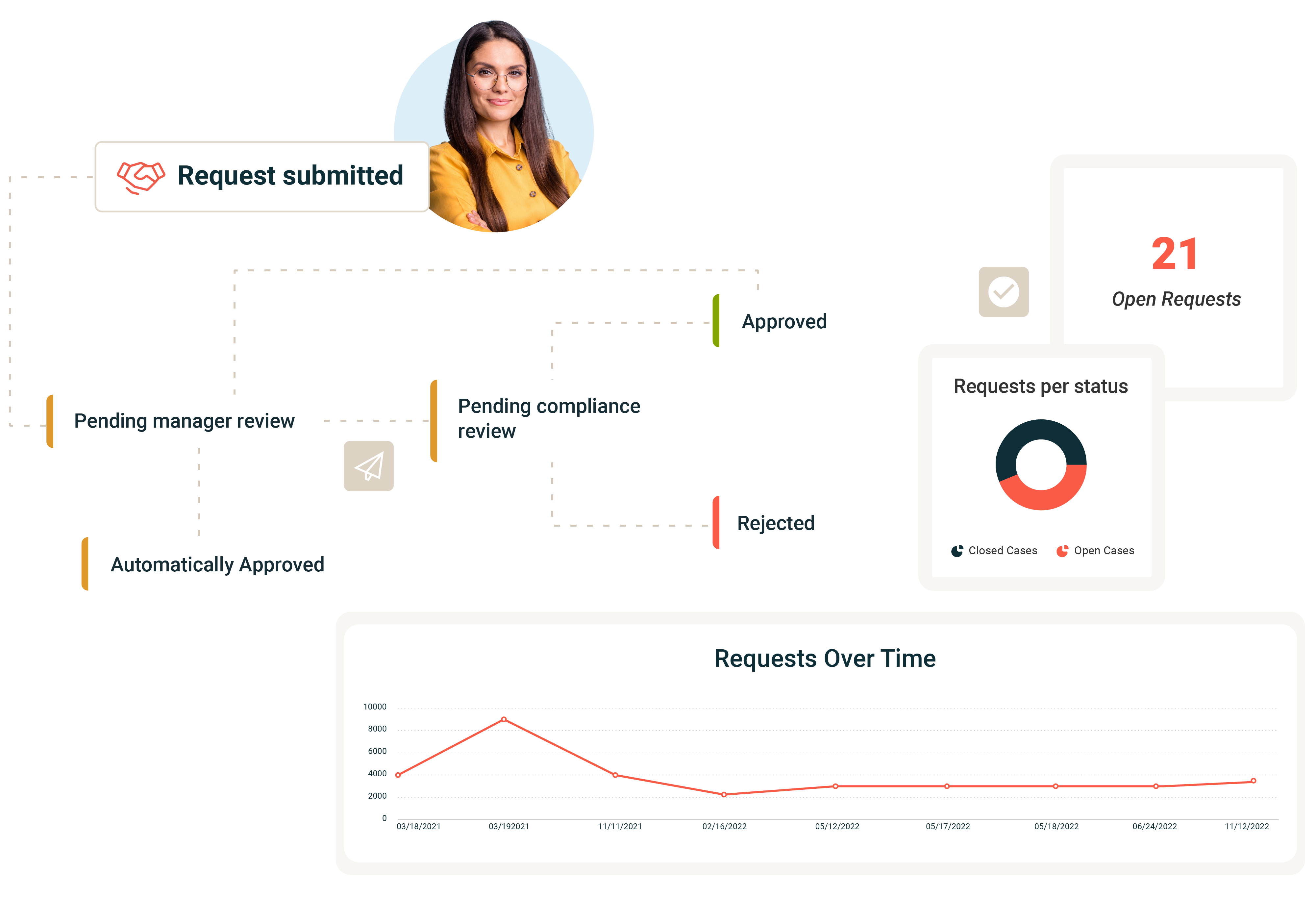
ABAC Program Management
Ensure your organization upholds ethical integrity and ABAC compliance through comprehensive risk assessments, effective policy management, and continuous monitoring. Capabilities include:
- Third-party due diligence: Mitigate bribery and corruption risks with integrated questionnaires, sanctions checks, and risk intelligence data.
- Disclosure management: Consolidate and assess conflicts of interest, gifts, travel, entertainment, and political and charitable contribution disclosures.
- Reporting and documentation: Maintain a complete audit trail and detailed reporting to easily demonstrate compliance to stakeholders and regulators.
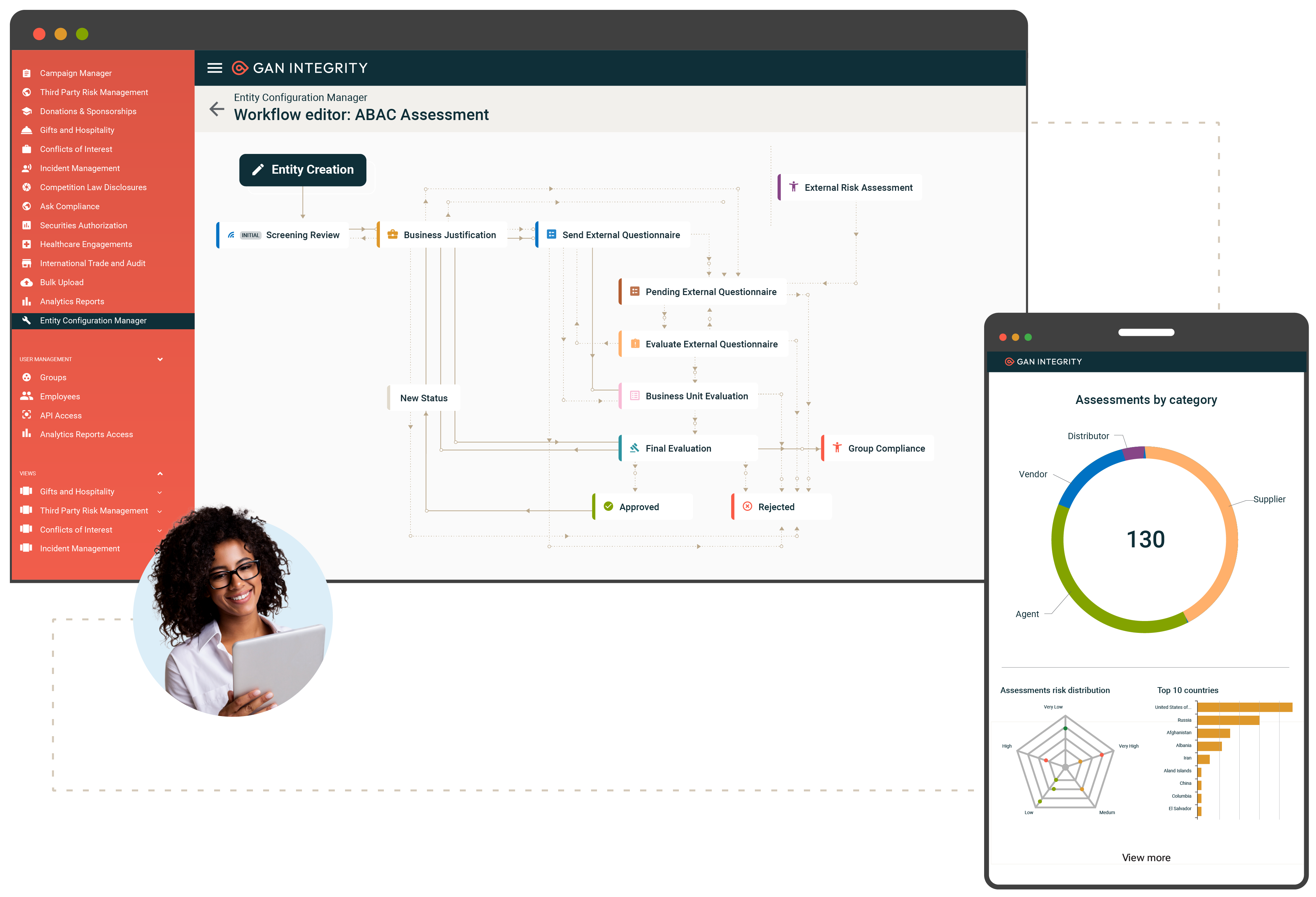
Supply Chain Due Diligence
Enhance supply chain risk management by consolidating processes, identifying and mitigating risks, and integrating data from various risk intelligence and business systems. Capabilities include:
- Automated risk assessments and continuous monitoring: Monitor suppliers continuously for adverse media, sanctions lists, PEP lists, forced labor, and ESG (Environmental, Social, and Governance) issues.
- High-risk supplier identification and management: Identify high-risk suppliers, manage them effectively, and track actions and mitigations to ensure compliance.
- Integrated due diligence assessments: Perform thorough due diligence across your business operations and workflows for seamless integration and enhanced efficiency.
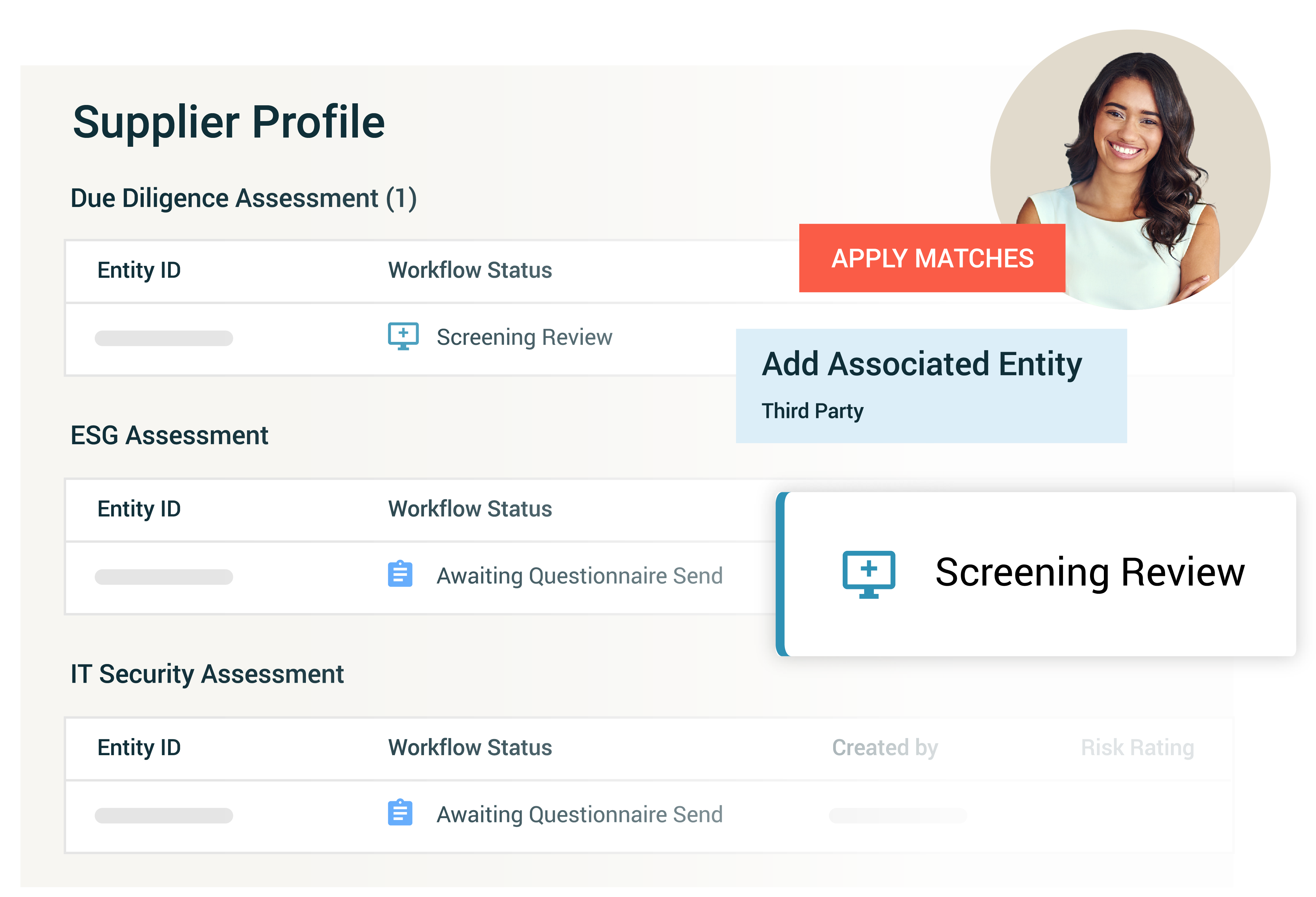
Third-Party Risk Management
Manage risks associated with third parties and assess these against relevant laws and organizational standards. Capabilities include:
- Lifecycle management: Automated workflows for onboarding, risk assessment, issue management, monitoring and off-boarding.
- Integrated due diligence: Initial and ongoing screening of third parties for sanctions, adverse media, forced labor, ESG and more.
- Reporting and analytics: Executive dashboards and reports: Consolidate third party data to identify risks and potential exposure to your organization
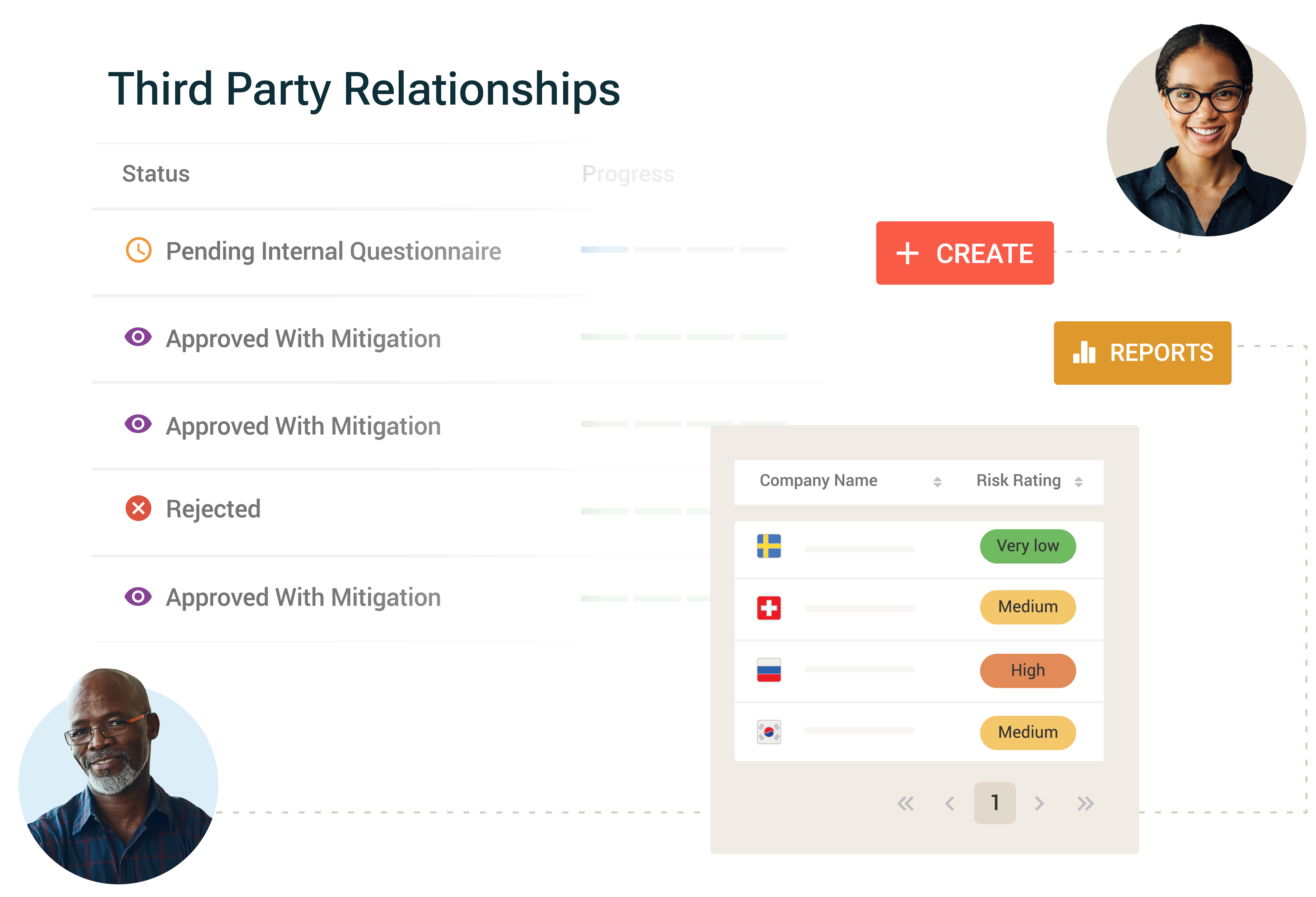
Reporting and Documentation
See everything across your compliance program, and generate reports and dashboards to demonstrate compliance program effectiveness to stakeholders and evidence to regulators. Capabilities include:
- Reporting and analytics: Executive, role-based dashboards to review the effectiveness of your compliance program initiatives.
- Evidence-based compliance: Maintain an auditable trail of all activity with the platform’s integrated and automated audit log.
- Compliance insights: See risk trends and patterns within your program, including third-party and supply chain risk, policies and disclosures.
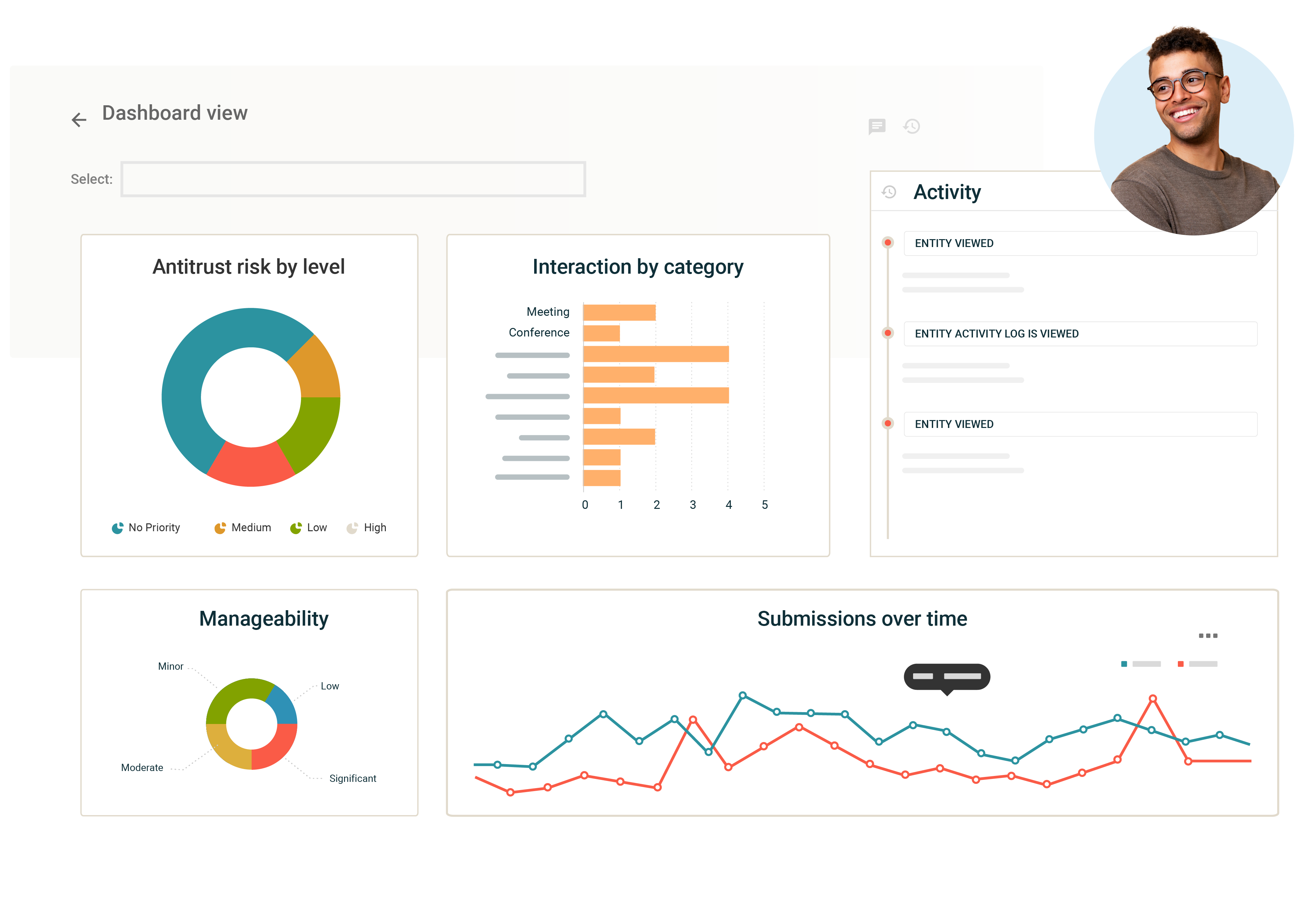
The GAN Integrity Platform means all your compliance and ethics programs can be managed in one place - now that's better.
What Our Customers Say
The other piece that I really liked about GAN, related to the investigations and the case management, was that it was pretty simple and straightforward. For a company like ours, which is a manufacturing company, we’re averaging somewhere between 20 and 30 cases coming in a month. We don’t need a lot of complexity. We need it to be pretty simple, straightforward, and easy to use. And that was one of the things that really appealed to me about GAN.
Deborah Spanic
Chief Ethics and Compliance Officer for Clarios
In our comprehensive compliance guide for the manufacturing industry we cover major trends, regulatory developments, and challenges facing the industry today. We explore simple best practices that companies can adopt to address these challenges effectively.
What’s inside?
- Trends in manufacturing and their compliance implications
- Key areas of compliance in the manufacturing industry
- Compliance best practices in manufacturing

